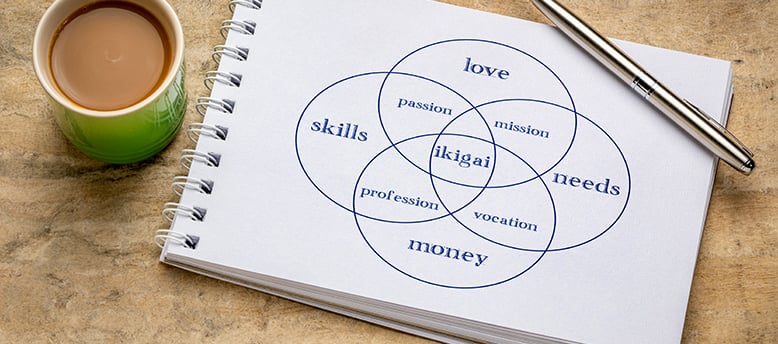Ikigai: An Ancient Compass Guiding Modern Life Journeys
Achieving happiness through ancient practices.
LIFE COACHING
Dr. Matthew Pierce
11/3/20233 min read


In a world constantly seeking novel methods to enhance well-being and purpose, an ancient Japanese concept has resurfaced with a profound resonance in the realm of modern life coaching: Ikigai (生き甲斐). Rooted in the tranquil islands of Okinawa, Ikigai represents a holistic approach to finding fulfillment and happiness in life. Translated as "reason for being," Ikigai is more than a philosophy; it's a voyage to the heart of our existence. Today, life coaches around the globe are adopting Ikigai to empower individuals in crafting a life rich with purpose and contentment.
The Four Pillars of Ikigai: A Framework for Fulfillment
At its core, Ikigai is built upon four fundamental questions that intersect at the point of personal bliss:
What do you love? (Your passion)
What are you good at? (Your vocation)
What can you be paid for? (Your profession)
What does the world need? (Your mission)
Life coaches use these queries as a scaffold to support clients in dissecting their lives and aspirations. Each question is not merely a superficial probe but a deep excavation of the soul's desires and the individual's potential.
Love and Vocation: The Personal Quadrants
Modern life coaching begins with self-discovery. Encouraging clients to reflect on what they genuinely love sets a foundation of passion. Coaches then assist in identifying their skills — the things they excel at. This intersection creates a powerful space where hobbies or interests can evolve into vocation, manifesting joy in everyday actions.
Profession and Mission: The Altruistic Quadrants
Ikigai also concerns itself with practicality and service. Coaches guide individuals in recognizing how they can turn their passions and talents into sustainable careers. More profoundly, they challenge them to contemplate how their work can contribute to the greater good — their mission. This encourages a shift from self-centric to world-centric thinking, promoting a sense of interconnectedness and responsibility.
Ikigai in Practice: A Pathway to Wholeness
Life coaches adopting Ikigai do not offer a one-size-fits-all blueprint. Instead, they provide a tailored map for each individual. Here's how Ikigai principles are applied in coaching practices:
Holistic Assessment: Coaches begin with a comprehensive review of a client's life, examining the balance between their passions, talents, societal contributions, and economic needs.
Value Clarification: Through Ikigai, coaches help clients identify and prioritize their values, aligning their life's direction with what matters most to them.
Goal Setting: Using the Ikigai framework, goals are set not just in career terms, but as a balance of personal satisfaction and social contribution.
Accountability Partners: Coaches serve as accountability partners, ensuring clients remain committed to their Ikigai-driven objectives.
Ikigai: The Antidote to Modern Malaise
Why does Ikigai resonate so deeply in today's fast-paced, often disorienting world? The answer may lie in its promise of harmony. In a society where the pursuit of money often overshadows passion and societal needs can eclipse personal joy, Ikigai reminds us of the beauty of balance. Life coaches leveraging Ikigai don't just steer clients towards success — they guide them to a success that is meaningful and joyous.
Transformative Questions for the Reader:
As you reflect upon your own life, consider these Ikigai-inspired questions:
What activities make you lose track of time?
When have you felt most proud of your work — not just for its rewards but for the work itself?
How can your personal interests serve a need in the world around you?
Are you nurturing your talents and using them to enrich not just your life but others' as well?
Ikigai isn't a quick fix. It's a lifelong commitment to a multifaceted exploration of self and service. As life coaches incorporate Ikigai into their practices, they offer a compass to navigate life's complexities — pointing the way to a deeply fulfilling and balanced existence.
Conclusion:
Ikigai's ancient wisdom, reimagined for the modern seeker, has found a welcome home in life coaching. It empowers a journey that goes beyond mere professional success, guiding individuals towards a harmonious and purpose-driven life. Perhaps the timelessness of Ikigai's appeal lies in its simplicity — a simple framework for a complex life, a quiet whisper that, amidst life's cacophony, reminds us what it means to truly live.
Life Coach, Spiritual Coach, Law of Attraction Coach, Reader, Psychic, Medium, Trance Channel and Teacher.
Contact Me


